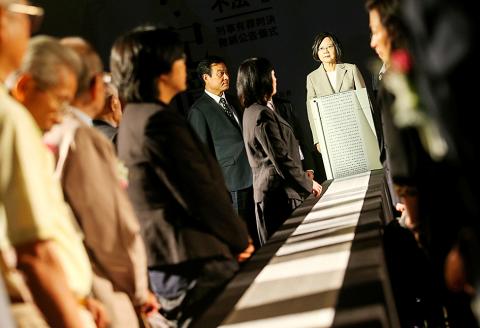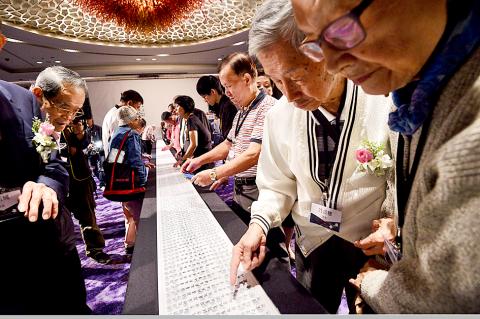The Transitional Justice Commission yesterday exonerated 1,270 people who were convicted after the 228 Incident, with commission Chairman Huang Huang-hsiung (黃煌雄) touting the move as “a small, but significant step toward realizing transitional justice.”
The commission held a news conference at the Sheraton Grand Taipei Hotel, which was attended by people who were wrongfully or unjustly tried during the White Terror era, as well as family members of those who have died.
President Tsai Ing-wen (蔡英文), Premier William Lai (賴清德), Legislative Speaker Su Jia-chyuan (蘇嘉全) and Control Yuan President Chang Po-ya (張博雅) also attended the news conference, which featured speeches by people affected by the 228 Incident and the White Terror era.

Photo: CNA
Chung Yi-jen (鍾逸人), 98, said he was arrested during the 228 Incident when he was 26 for trying to protect his hometown of Taichung against the “corrupt” officials and troops Chiang Kai-shek (蔣介石) sent from China, who “bullied and slaughtered” Taiwanese.
“I did not break the law. I was just a Taiwanese trying to defend his country,” Chung said, expressing his gratitude to Tsai for “restoring people’s reputations.”
The Chinese Nationalist Party (KMT) gained control of Taiwan after World War II and in 1947 sparked the 228 Incident, which ushered in the White Terror era after Chiang dispatched legions of troops to Taiwan to quash the uprising.

Photo: Peter Lo, Taipei Times
Chiang in 1949, the same year he imposed martial law, retreated to Taiwan with the KMT after its defeat in the Chinese Civil War.
Wu Sheng-jun (吳聲潤), who was sentenced to 12 years in prison for making grenades for a rebel group, said he still weeps when he thinks about his lost friends, who were bludgeoned to death by the then-KMT regime, many of whom he said loved their country and were outstanding people.
Wu, 95, said the US saved Chiang’s life by deploying the US Seventh Fleet to help defend Taiwan after the Korean War, but Chiang was arresting and killing Taiwanese.
Wu thanked Tsai and the “indigenous” government she leads for repealing the unjust convictions imposed on “ill-fated” Taiwanese who until then had been living in disgrace.
Taiwan experienced a dark age before it was democratized, with some people not understanding why they were interrogated or were to be executed, Tsai said.
“Many people and their families spent most of their lives in the hope of redress,” Tsai said. “Although the government conferred certificates to warrant the restoration of their reputations, the erroneous convictions were never repealed.”
Apologizing to those who did not live to witness their exoneration, as well as their families, Tsai said the day came late, “but it is better late than never.”
The president thanked the Legislative Yuan for passing the Act on Promoting Transitional Justice (促進轉型正義條例), without which the exonerations could not have been granted.
She called on the commission to continue to solemnly and steadfastly perform its duties of redressing judicial injustices, attributing responsibility for past injustices and establishing historical facts to “regain the public’s trust.”
“Democracy will not take a backward step and neither will transitional justice,” Tsai said.
“Only by persistently learning history’s lessons can we truly move toward reconciliation,” she said.
Due to legal restrictions imposed by Article 9 of the National Security Act (國家安全法) and interpretations delivered by the Council of Grand Justices, crimes people were convicted of during the authoritarian period could not be annulled, the commission said.
However, thanks to the transitional justice act, the convictions can be repealed after the cases are published by the authorities, the commission said.
Yesterday’s exonerees were mostly accused of espionage or rebellion against the government during the Martial Law era, the commission said, adding that the Executive Yuan had published their names in a gazette on its Web site.
The exonerations marked the first set in a series of three, with about 10,000 more people to be exonerated, Huang said.
While the first batch represented just a small step, Huang said he hoped it would prove to be a significant step for the quest for transitional justice.
Statistics released by the commission showed that 1,216 men and 54 women were exonerated yesterday, including 274 who were executed.

CHAOS: Iranians took to the streets playing celebratory music after reports of Khamenei’s death on Saturday, while mourners also gathered in Tehran yesterday Iranian Supreme Leader Ayatollah Ali Khamenei was killed in a major attack on Iran launched by Israel and the US, throwing the future of the Islamic republic into doubt and raising the risk of regional instability. Iranian state television and the state-run IRNA news agency announced the 86-year-old’s death early yesterday. US President Donald Trump said it gave Iranians their “greatest chance” to “take back” their country. The announcements came after a joint US and Israeli aerial bombardment that targeted Iranian military and governmental sites. Trump said the “heavy and pinpoint bombing” would continue through the week or as long

TRUST: The KMT said it respected the US’ timing and considerations, and hoped it would continue to honor its commitments to helping Taiwan bolster its defenses and deterrence US President Donald Trump is delaying a multibillion-dollar arms sale to Taiwan to ensure his visit to Beijing is successful, a New York Times report said. The weapons sales package has stalled in the US Department of State, the report said, citing US officials it did not identify. The White House has told agencies not to push forward ahead of Trump’s meeting with Chinese President Xi Jinping (習近平), it said. The two last month held a phone call to discuss trade and geopolitical flashpoints ahead of the summit. Xi raised the Taiwan issue and urged the US to handle arms sales to

State-run CPC Corp, Taiwan (CPC, 台灣中油) yesterday said that it had confirmed on Saturday night with its liquefied natural gas (LNG) and crude oil suppliers that shipments are proceeding as scheduled and that domestic supplies remain unaffected. The CPC yesterday announced the gasoline and diesel prices will rise by NT$0.2 and NT$0.4 per liter, respectively, starting Monday, citing Middle East tensions and blizzards in the eastern United States. CPC also iterated it has been reducing the proportion of crude oil imports from the Middle East and diversifying its supply sources in the past few years in response to geopolitical risks, expanding

Pro-democracy media tycoon Jimmy Lai’s (黎智英) fraud conviction and prison sentence were yesterday overturned by a Hong Kong court, in a surprise legal decision that comes soon after Lai was jailed for 20 years on a separate national security charge. Judges Jeremy Poon (潘兆初), Anthea Pang (彭寶琴) and Derek Pang (彭偉昌) said in the judgement that they allowed the appeal from Lai, and another defendant in the case, to proceed, as a lower court judge had “erred.” “The Court of Appeal gave them leave to appeal against their conviction, allowed their appeals, quashed the convictions and set aside the sentences,” the judges